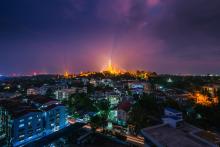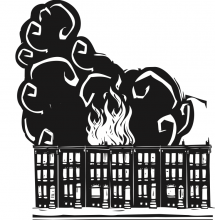Nonviolence
There are different ways to understand the gospel's call to peace — and that's a good thing. In the last century alone, many influential Christian leaders have grappled with violence, justice, and peace, and ended up all over the nonviolence map. Where do you land? Take our quiz and find out!

Christian leaders have hailed as an act of bravery and selflessness the shielding of some Christians by Muslims after suspected al-Shabab gunmen in Mandera County ambushed a passenger bus.

IN THE LATE 1930s, a large swath of the American church was reluctant for the United States to become involved in another war in Europe. The memory of the Great War was too fresh; what had been intended to be “a war to end all wars,” a crusade for freedom and democracy, in hindsight just looked like senseless horror. Entire denominations committed to peace positions.
This pacifist sentiment troubled Reinhold Niebuhr, who was following the rise of Hitler and spoke out against the atrocities committed against Jews long before they had reached the national consciousness. So in 1940 Niebuhr penned an essay to rally what he saw as a disillusioned, passive church into taking concrete action for social justice. He titled the essay “Why the Christian Church is Not Pacifist” and argued that in a world marred by sin, coercion and violence were sometimes necessary to pursue justice.
After the attack on Pearl Harbor, Niebuhr’s argument against pacifism won the day; U.S. churches lined up en masse to support the war effort. Since then, many Christians have taken it for granted that violence is an unfortunate but realistic necessity if we hope to bring justice in a world where injustice is so pervasive.
Yet a survey of 20th century theology shows that many Christians have grappled with violence, justice, and the gospel and arrived at conclusions quite different from Niebuhr—and from each other. These Christian witnesses for peace include familiar voices such as Dorothy Day, Thomas Merton, Martin Luther King Jr., John Howard Yoder, and Stanley Hauerwas, but also many less well-known voices, such as the ones listed on the following pages. Examined together, these eight perspectives show that Christian nonviolence isn’t a singular position, but rather a rich conversation wrestling with what it means to live out the biblical call to justice amid the complexities of ever-changing political, social, and moral situations.

I wonder if Pope Francis knows that he’s being used to justify bombing Syria.
After an all-day debate on Dec. 2, the House of Commons authorized the British government to begin bombing ISIS in Syria. Hours later, RAF Tornadoes attacked an oil field in eastern Syria.
During the debate, Caroline Spelman, the member of parliament who represents the Church of England in the Commons, noted that, “The Archbishop of Canterbury made it clear that, in his view, force might be necessary to keep the refugees safe.”
Then, citing Pope Francis, she said, “‘Where aggression is unjust, aggression is licit against the aggressor.’ These are views which I share, which is why I will support the motion.”

The Nobel laureate and human rights advocate Aung San Suu Kyi entered the Myanmar Parliament this week, shortly after her party, the National League for Democracy, won the country's first free election in 25 years.
In those 25 years — since the 1990 election, which the NLD also won — Aung San Suu Kyi spent a total of 15 years without her freedom, having been placed under house arrest by the ruling military government which ignored the election results.
Since 1988, Ms. Suu Kyi has led nonviolent opposition to the military government. Last week’s landslide election results, which took the ruling generals by surprise, demonstrate once again that nonviolence is a force more powerful than violence.

President Obama has decided to deploy a small number of American Special Operations forces to Syria, according to the New York Times.
CNN reports a senior administration official said the forces will be "fewer than 50."

Tall, lanky, cheerful, and confident, Esmatullah easily engages his young students at the Street Kids School, a project of Kabul’s Afghan Peace Volunteers, an antiwar community with a focus on service to the poor. Esmatullah teaches child laborers to read. He feels particularly motivated to teach at the Street Kids School because, as he puts it, “I was once one of these children.”
Esmatullah began working to support his family when he was 9 years old. Now, at age 18, he is catching up on school.He has reached the tenth grade, takes pride in having learned English well enough to teach a course in a local academy, and knows that his family appreciates his dedicated, hard work.
When Esmatullah was nine, the Taliban came to his house looking for his older brother. Esmatullah’s father wouldn’t divulge information they wanted. The Taliban then tortured his father by beating his feet so severely that he has never walked since. Esmatullah’s dad, now 48, has never learned to read or write. There are no jobs for him.

“U.S. military intervention is the problem, not the solution. Since the U.S. started bombing Iraq and Syria last year, ISIS has grown stronger.”
In the months since Cortright’s charge the world has witnessed millions of Syrian citizens fleeing the conflict. Having saturated the capacity of neighboring nations to accept refugees, displaced Syrians have continued north through Turkey and Eastern Europe, en route to Germany and neighboring countries. In September, Russia inserted itself into the Syrian military calculus, offering military support for, it claimed, the Assad regime’s fight against ISIS. Instead Russian bombs showered insurgent Syrian rebel forces. Recent reports confirm that Russia is actually helping Assad retake Aleppo, the largest city in Syria, from insurgent forces, with an Iranian assist.
In moments like these it is tempting to stand in solidarity with the disciple Peter, who tried to defend the helpless with military might. When Jesus was seized by temple police, Peter took out his blade and sliced off the ear of the high priest’s servant, Malchus. (Matt. 26:51-56, Luke 22:50, John 18:10-11). Jesus stopped him.

Three years ago, I was a U.S. State Department officer deployed to Turkey to work with the Syrian opposition. It was an amazing opportunity to support Syrian activists and civic leaders waging an improbable — yet remarkable — popular struggle, against a criminal regime that responded to peaceful protests with bullets and torture. For [the previous] eight months since the start of the revolution in March 2011, Syrian activists — Sunni, Christian, Kurdish, Druze, and Alawite — had used demonstrations, sit-ins, resistance music, colorful graffiti, online satire, and dozens of other nonviolent tactics to challenge the Assad regime. My task, along with that of my U.S. government and international colleagues, was to aid their efforts.
A year earlier, I co-wrote and published a book with Erica Chenoweth, called Why Civil Resistance Works: The Strategic Logic of Nonviolent Conflict. In it, we tested the conventional wisdom that only violence works against formidable foes like dictatorships and foreign military occupations. In studying 323 violent and nonviolent campaigns from 1900-2006, Erica and I found that nonviolent civil resistance was twice as successful as armed struggle — even against militarily superior opponents willing to use violence. We also found that nonviolent struggle helps consolidate democracy and civil peace.

Our class studying terrorism found itself under terrorist attack.
You might expect these military men would be first in line calling for the use of force. You would be wrong. Veterans of the first Iraq war, they, like Gen. Colin Powell, warned that starting a war would be easy, but accomplishing anything good by the use of force in the region would be hard. Military attacks would "rearrange the rubble" and incite retribution and further cycles of violence. They urged other responses — political engagement, diplomacy, [and] legal and financial instruments.
As advisors to the U.S. Catholic Bishops, we also urged using “just peace” methods. Pope — now Saint — John Paul II urged President Bush not to invade Iraq but to pursue a just peace. The U.S. invasion would de-stabilize the entire region, cause worse bloodshed, and do more harm than good.
Today, as then, the military and religious leaders agree. We ought to notice.

Just as the Treaty of Versailles crushed the Germans after WWI to become the resentment stream [from which] the Nazis flowed, so the Sykes-Picot [Agreement] of the same time crushed the Muslim Middle East under colonialism, followed by dictatorships, then deepened by the 2003 invasion of Iraq.
We can all lament or question the necessary violence required to stop IS brutality. [But] many of our church traditions had blessed as “necessary” the waves of past violence that helped create the poisoned well [from which] the IS flows.
Turning to theology — Joseph, Elisha, and Jesus stood in similar rivers of death yet turned to life.

The Great War that engulfed Europe from 1914-1918 was a bitter disappointment for the peace movement. As the 19th century came to a close, the promise of progress that accompanied Darwin’s discovery of the evolution of life on earth seemed to put peace within our grasp. “Progress” was the popular byword and always meant a movement toward something better. It was the age of invention and industrialization. Human beings were overflowing with strategies to improve the lives of the poor, the uneducated, the working class, and the least and the last among us. The women’s rights movement was flourishing as well, and Dr. Maria Montessori, the first woman in Italy to receive a medical degree (1896) was an outspoken and popular representative of the cause. But 1914 dashed all that hope.
Many are the disappointments in the world today, as well, if your goal is peace. We are witnessing the greatest number of people displaced by violence and war since the second Great War in Europe. Even so, much progress has also been made by movements advocating for the rights of groups excluded from privilege and power. Women, labor, the disabled, LGBTQ, the poor, and the sick have all witnessed their rights expand. And yet war continues. We are living in the best of times and the worst of times, it seems — a paradox that causes many of us to careen between hope and despair, unsure of how to move beyond the motion sickness.

While I do think there are situations in which violent conflict can be justified (the classic example being fighting to bring down Nazi Germany in WWII), I don’t think it can ever be done so in Christian terms. Theologically, we cannot agree if you assert that killing of any kind can be justified in the name of Christ. I believe this for the reasons given above, namely that Jesus lived, died, and lived again to affirm the blessedness and the sanctity of the lives we live together.
The Christ I know is one of life and peace, even in the face of death. Christ shows us that even if we can’t avoid death, much as we might like to because we are human and a fear of death is natural, we know that life wins out. This is what we’re asked to affirm in when faced with the empty tomb. Losing our fear of harm and death, and lifting up a savior who delights in lives lived fully, is our Christian call. Why can’t we trust in that more than a gun?

Jesus is the fullness of God in bodily form. Too often this point is missed. Not only do Christians overlook Jesus’ hermeneutics, but so too do we miss just how merciful he is. It seems as if his mercy is tempered by our presupposed understanding of God’s wrath and vengeance. A "theology of the cross," as Martin Luther introduced us to, is rarely considered by many of us in the West. That is tragic.
So what do I say to those who hold to a theology that includes violence?
Start everything with Jesus. Read your Bible with Jesus. Approach the Father in the same way Jesus did — as Abba. Stop "searching the scriptures" prior to coming to Jesus. He is our model in all things — in how we engage the world with grace and mercy and compassion, and in how we read our Bibles.

In the face of wars, refugee crises, weapon proliferation, and unaddressed climate change impacts, let us echo the common sense of children. Let goodness shine.
Or, as our young friends in Afghanistan have put it, #Enough! They write the word, in Dari, on the palms of their hands and show it to cameras, wanting to shout out their desire to abolish all wars.
This past summer, collaborating with Wisconsin activists, we decided to feature this refrain on signs and announcements for a 90-mile walk campaigning to end targeted drone assassinations abroad, and the similarly racist impunity granted to an increasingly militarized police force when they kill brown and black people within the U.S.

As we mark the 70th anniversary of the atomic bombings of Hiroshima and Nagasaki, the world waits to see if the Iran deal will come to fruition and thus avoid war. Once again, the debate about nuclear weapons appears at the forefront. At the same time, inside the U.S., the #BlackLivesMatter movement continues to make clear it will no longer be politics as usual as activists organize, protest, and fight every day to destroy institutional racism. However, it is no coincidence that these events are all happening simultaneously as they have always been and continue to be inextricably linked.

Years before the gay rights movement gained momentum, an openly gay black activist named Bayard Rustin advised Martin Luther King Jr. on nonviolent protest tactics and organized the 1963 March on Washington. But attacks on Rustin’s sexual orientation threatened his role in the civil rights movement.
Rustin died in 1987 at age 75 after decades as an activist and organizer on issues including peace, racial equality, labor rights, and gay rights. He will be remembered for support for LGBT rights during the National LGBT 50th Anniversary Celebration July 2-5 in Philadelphia. The four-day event recalls gay rights activists who demonstrated for equal rights at Independence Hall on the Fourth of July from 1965 to 1969.

When the high priest's guard came to arrest Jesus and execute him under an unjust oppressive legal system on a false charge, Peter wasn't having it.
The police tried to apprehend Jesus and met Peter's sword coming at their heads. He cut off the high priest's servant's ear in the process. Peter wasn't marching. He wasn't rallying. He wasn't chanting or trying persuade the establishment to review their policies. He wasn't even looting, taking his anger out on inanimate objects. He was trying to protect his friend by violently acting out directly towards those who had been tasked to carry out the injustice.
Peter didn't try to reason with the men, but with his actions, Peter loudly and clearly said, "F*** the police!"

Bio: Erika Totten is a leader in the Black Lives Matter movement in Washington, D.C., and the black liberation movement at large. She is a former high school English literature teacher, a wife, a stay-at-home mom, and an advocate for the radical healing and self-care of black people through “emotional emancipation circles.”
1. How did you get started with “emotional emancipation” work?
Emotional emancipation circles were created in partnership with The Association of Black Psychologists and the Community Healing Network. I was blessed to be one of the first people trained in D.C. I had been doing this work before I knew what it was called. My organization is called “Unchained.” It is liberation work—psychologically, mentally, spiritually, and emotionally.
I want to tell people to be intentional about self-care. Recently, we had a black trans teen, who was an activist, commit suicide. A lot of times you need to see a counselor or therapist, which is often shunned in the black community. Because of racism, we are taught that we need to be “strong.” But it’s costing us our lives. As much as we are dismantling systems, we have to dismantle anything within ourselves that is keeping us from experiencing liberation right now.

I love Martin Luther King. I wrote my master’s thesis on his approach to nonviolence. King is the greatest prophet in the history of the United States. And white people should know him better.
Blitzer, like so many white people, doesn’t know Martin Luther King. He misses King’s point. If white people want to reference King, we need to stop using him to condemn black violence. We need to stop pitting a black man against black people. It’s patronizing. It’s demeaning. And it misses the point.